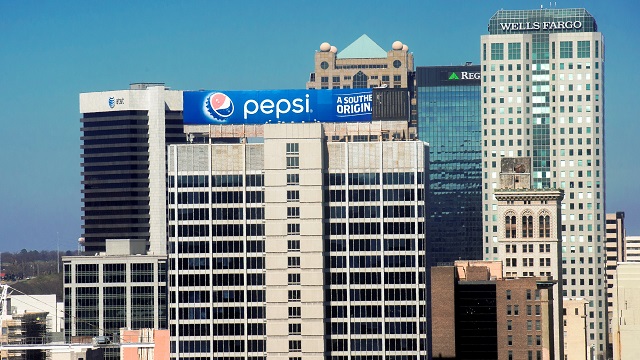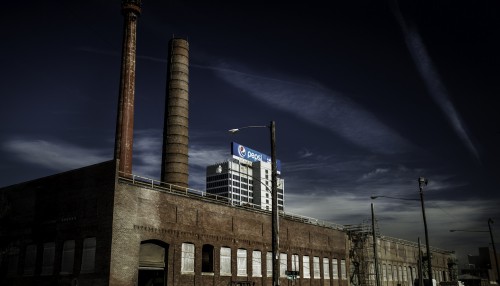Birmingham’s skyline is Pepsi-free as sign is replaced with new images

The Pepsi sign was removed from the top of the Two North Twentieth Building in downtown Birmingham to make way for a new sign for UAB. (contributed)
Buffalo Rock‘s Pepsi billboard that has overlooked the city from the Two North Twentieth Building is being replaced by new signage that celebrates the relationship between Birmingham and the University of Alabama at Birmingham.
Work started today to remove the old billboard and install the new sign, a process that is expected to take about two weeks.

The Pepsi sign, as seen from Powell Avenue Steam plant, is being replaced with a new one from UAB that celebrates Birmingham’s iconic images. (Christopher Jones/Alabama NewsCenter)
The new sign, 179 feet by 25 feet, will feature a variety of iconic images that showcase Birmingham’s historic past surrounding the UAB logo.
“The new sign is a visual blend of old and new, paying homage to Birmingham’s rich history while underscoring the unique partnership between the city of Birmingham and UAB,” said UAB President Ray L. Watts. “The future of this region will be driven by collaboration between Birmingham, Jefferson County, UAB, the Birmingham Business Alliance and business and civic leaders and their respective organizations. The new signage is an affirmation of that mutually beneficial relationship.”
The iconic images from Birmingham’s past and present will be unveiled over the next two weeks bit by bit on UAB and UAB Medicine Twitter, Facebook and Instagram accounts as the process of installing the sign progresses. The new images will also be released on Alabama NewsCenter’s site and social media accounts.
“Visible across the whole city of Birmingham, and even from aircraft on approach to Birmingham-Shuttlesworth International Airport, the sign will herald the excitement driving UAB and Birmingham forward,” said Will Ferniany, CEO of the UAB Health System. “We are excited to be part of the renaissance of this vibrant city.”
UAB is Alabama’s largest employer, with 23,000 employees. The university spent $272 million with more than 1,700 Birmingham suppliers in fiscal year 2015, and has an overall economic impact of $5 billion.





